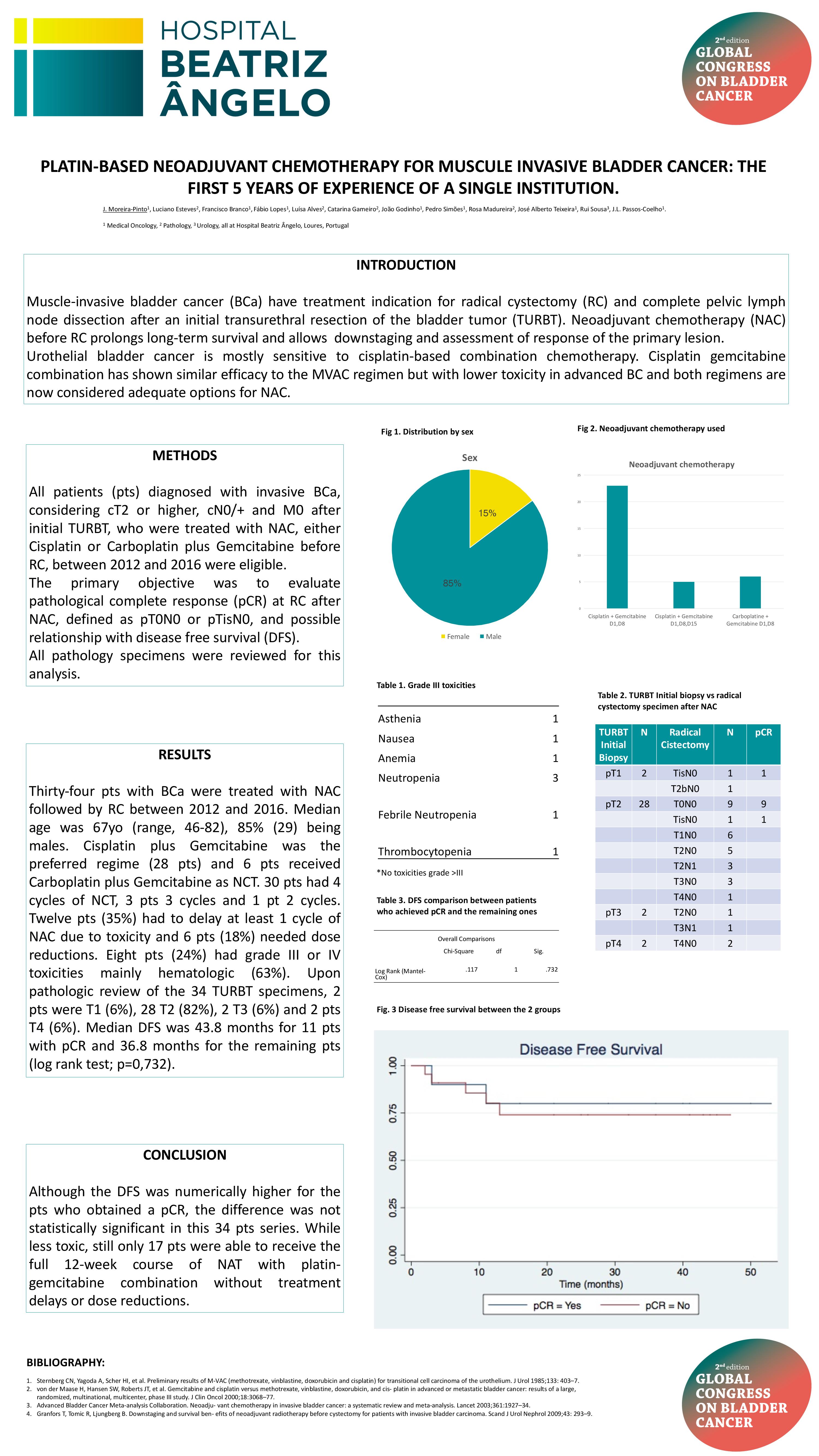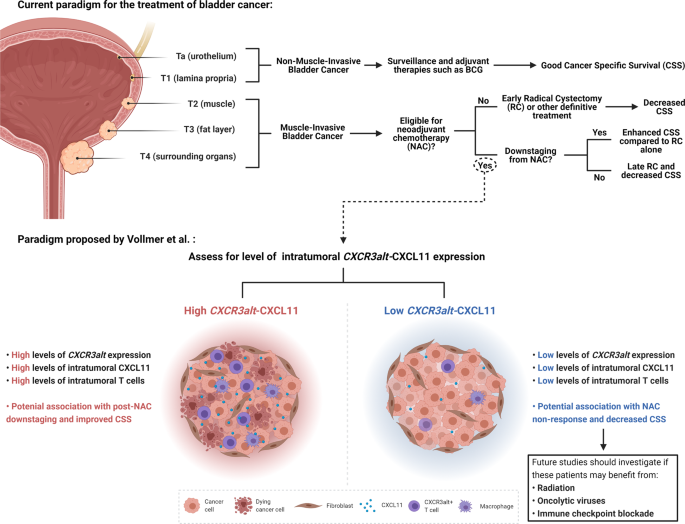Traditionally neoadjuvant therapy for bladder cancer has been underused in clinical practice although it is supported by level 1 evidence. A neoadjuvant therapy is one that is administered before the main form of treatment to help increase the likelihood of a successful outcome.

Can Biomarkers Guide The Use Of Neoadjuvant Chemotherapy In T2 Bladder Cancer European Urology Oncology
There was evidence of tumor down-staging in the bladder after neoadjuvant chemotherapy.

Neoadjuvant chemotherapy for bladder cancer. Stage pT0 at cystectomy was found in 5 of 25 patients 20 in the GC RC group and in 7 of 135 patients 5 in the RC group model-based risk difference adjusted for clinical stage 16 P 03. Bladder cancer BC is the fifth most commonly diagnosed malignancy in the United States. Upper tract urothelial carcinoma shares similar biology with muscle-invasive bladder cancer and chemotherapy is standard in the perioperative setting for muscle-invasive bladder cancer.
The objective of the current study was to assess the effect of neoadjuvant chemotherapy on the probability of non-organ-confined disease and overall survival after radical cystectomy RC in patients. A randomised controlled trial. The common theme in all of these studies has been to select patients with a pCR to chemotherapy or chemoradiation for bladder preservation.
Another 19 patients with invasive transitional-cell carcinoma of the bladder received 2 or 3 cycles of neoadjuvant chemotherapy using the modified M-VAC or MEC methotrexate epirubicin and cisplatin regimen. Neoadjuvant cisplatin methotrexate and vinblastine chemotherapy for muscle-invasive bladder cancer. The efficacy of neoadjuvant chemotherapy NAC for muscle-invasive bladder cancer BCa was established primarily with methotrexate vinblastine doxorubicin and cisplatin MVAC with complete response rates pT0 as high as 38.
However maximal transurethral resection of bladder tumor TURBT was performed before NAC to define the pathology impacting the real evaluation of NAC. Update of a systematic review and meta-analysis of individual patient data advanced bladder cancer ABC meta-analysis collaboration. Although neoadjuvant cisplatin-based chemotherapy is currently recommended by NCCN and EAU guidelines in patients with muscle-invasive UBC the optimal chemotherapy.
It may also reduce the risk of cancer recurrence. Based on the added challenges of completing chemotherapy after major surgery as well as the known survival advantage of preoperative chemotherapy in bladder cancer at Memorial Sloan Kettering we recommend neoadjuvant cisplatin-based chemotherapy for individuals who present with invasive disease and are cisplatin candidates. Neoadjuvant Chemotherapy for Bladder Preservation.
The natural history of muscle-invasive bladder cancer suggests that aggressive management with both local and systemic therapy is needed in view of the incidence of distant recurrence 2050 and locoregional recurrence 515 after cystectomy. Although this strategy appears promising bladder. Perioperative chemotherapy either neoadjuvant or adjuvant has been used in an effort to improve survival and.
Reduced quality of life after cystectomy has made bladder preservation a popular research topic for muscle-invasive bladder cancer MIBC. The most common toxic effects were gastrointestinal symptoms alopecia and myelosuppression. Platinum-based neoadjuvant chemotherapy NCT has been shown to improve survival outcomes in muscle-invasive bladder cancer MIBC patients but the optimal neoadjuvant regimen has not been established.
Controversy exists as to whether neoadjuvant chemotherapy improves survival in patients with invasive bladder cancer despite randomised controlled trials of more than 3000 patients. Methotrexate vinblastine doxorubicin and cisplatin MVAC and gemcitabine and cisplatincarbop. Of 18 pathologically evaluable patients who underwent radical cystectomy or partial.
This research aimed to assess real NAC efficacy without interference from TURBT. Neoadjuvant chemotherapy with or without radiation therapy has been administered for muscle-invasive bladder cancer as a bladder-preserving strategy. Neoadjuvant chemotherapy regimens based on methotrexate vinblastine doxorubicin cisplatin or cisplatin-gemcitabine were associated with an absolute increase in 5-year survival of 8 in patients with muscle invasive-bladder cancer.
Neoadjuvant chemotherapy in pure urothelial bladder cancer provides a significant survival benefit. Neoadjuvant chemotherapy should be considered in locally advanced GBC with the aim of increasing the resectablility in these patients. Although micropapillary bladder cancer is assumed to not respond well to chemotherapy a definitive statement on its sensitivity has not been established and a consensus on the use of neoadjuvant.
Neoadjuvant chemotherapy for bladder cancer may be recommended to help destroy cancer cells shrink tumors and allow a surgeon to remove cancerous growths more easily. Neoadjuvant chemotherapy can downsize the tumor in approximately 50 of the patients leading to R0 resection. However to the authors knowledge it is unknown whether this benefit persists in histological variants.
533 - 540 Erratum Lancet 19993541650. 2 One main reason is that the adverse effects associated with cisplatin-based chemotherapy and the requirement of hydration may affect the tolerability and treatment adherence of patients. Previous research has indicated significant tumor downstaging after neoadjuvant chemotherapy NAC.
One of the challenges with chemotherapy for patients with upper tract urothelial carcinoma is that prior to radical nephroureterectomy 50 of patients have an eGFR. Advanced Bladder Cancer ABC Meta-analysis Collaboration Neoadjuvant chemotherapy in invasive bladder cancer.

Effectiveness Of Adjuvant Chemotherapy After Radical Cystectomy For Locally Advanced And Or Pelvic Lymph Node Positive Muscle Invasive Urothelial Carcinoma Of The Bladder A Propensity Score Weighted Competing Risks Analysis European Urology Focus

A Systematic Review Of Neoadjuvant And Adjuvant Chemotherapy For Muscle Invasive Bladder Cancer European Urology

Pathologic Downstaging Is A Surrogate Marker For Efficacy And Increased Survival Following Neoadjuvant Chemotherapy And Radical Cystectomy For Muscle Invasive Urothelial Bladder Cancer European Urology

Discerning Patterns And Quality Of Neoadjuvant Chemotherapy Use Among Patients With Muscle Invasive Bladder Cancer European Urology Oncology

Outcomes For Muscle Invasive Bladder Cancer With Radical Cystectomy Or Trimodal Therapy In Us Veterans European Urology Open Science

Randomised Phase Iii Study Of Neoadjuvant Chemotherapy With Methotrexate Doxorubicin Vinblastine And Cisplatin Followed By Radical Cystectomy Compared With Radical Cystectomy Alone For Muscle Invasive Bladder Cancer Japan Clinical Oncology Group

Impact Of Gender On Chemotherapeutic Response And Oncologic Outcomes In Patients Treated With Radical Cystectomy And Perioperative Chemotherapy For Bladder Cancer A Systematic Review And Meta Analysis Clinical Genitourinary Cancer

Outcomes In Patients With Muscle Invasive Bladder Cancer Treated With Neoadjuvant Chemotherapy Followed By Chemo Radiotherapy In The Bc2001 Trial European Urology

Will The Use Of Biomarkers Improve Bladder Cancer Radiotherapy Delivery Clinical Oncology

Neoadjuvant Chemotherapy Reinforces Antitumour T Cell Response In Urothelial Urinary Bladder Cancer European Urology

Superior Efficacy Of Neoadjuvant Chemotherapy And Radical Cystectomy In Ct3 4an0m0 Compared To Ct2n0m0 Bladder Cancer Hermans 2019 International Journal Of Cancer Wiley Online Library

A Phase Ii Study Of Neoadjuvant Chemotherapy Followed By Organ Preservation In Patients With Muscle Invasive Bladder Cancer Sciencedirect

Eau 2021 Is There A Role For Neoadjuvant Immunotherapy In Muscle Invasive Bladder Cancer

Neoadjuvant Chemotherapy Before Bladder Sparing Chemoradiotherapy In Patients With Nonmetastatic Muscle Invasive Bladder Cancer Clinical Genitourinary Cancer

Unfavorable Cancer Specific Survival After Neoadjuvant Chemotherapy And Radical Cystectomy In Patients With Bladder Cancer And Squamous Cell Variant A Multi Institutional Study Sciencedirect

Platin Based Neoadjuvant Chemotherapy For Muscule Invasive Bladder Cancer The First 5 Years Of Experience Of A Single Institution

Randomised Phase Iii Study Of Neoadjuvant Chemotherapy With Methotrexate Doxorubicin Vinblastine And Cisplatin Followed By Radical Cystectomy Compared With Radical Cystectomy Alone For Muscle Invasive Bladder Cancer Japan Clinical Oncology Group

The Cxcr3alt Cxcl11 Axis In Bladder Cancer Potential For Prediction Of Neoadjuvant Chemotherapy Response Cellular Molecular Immunology

Summary Of Key Studies Of Adjuvant And Neoadjuvant Chemotherapy In Download Table

